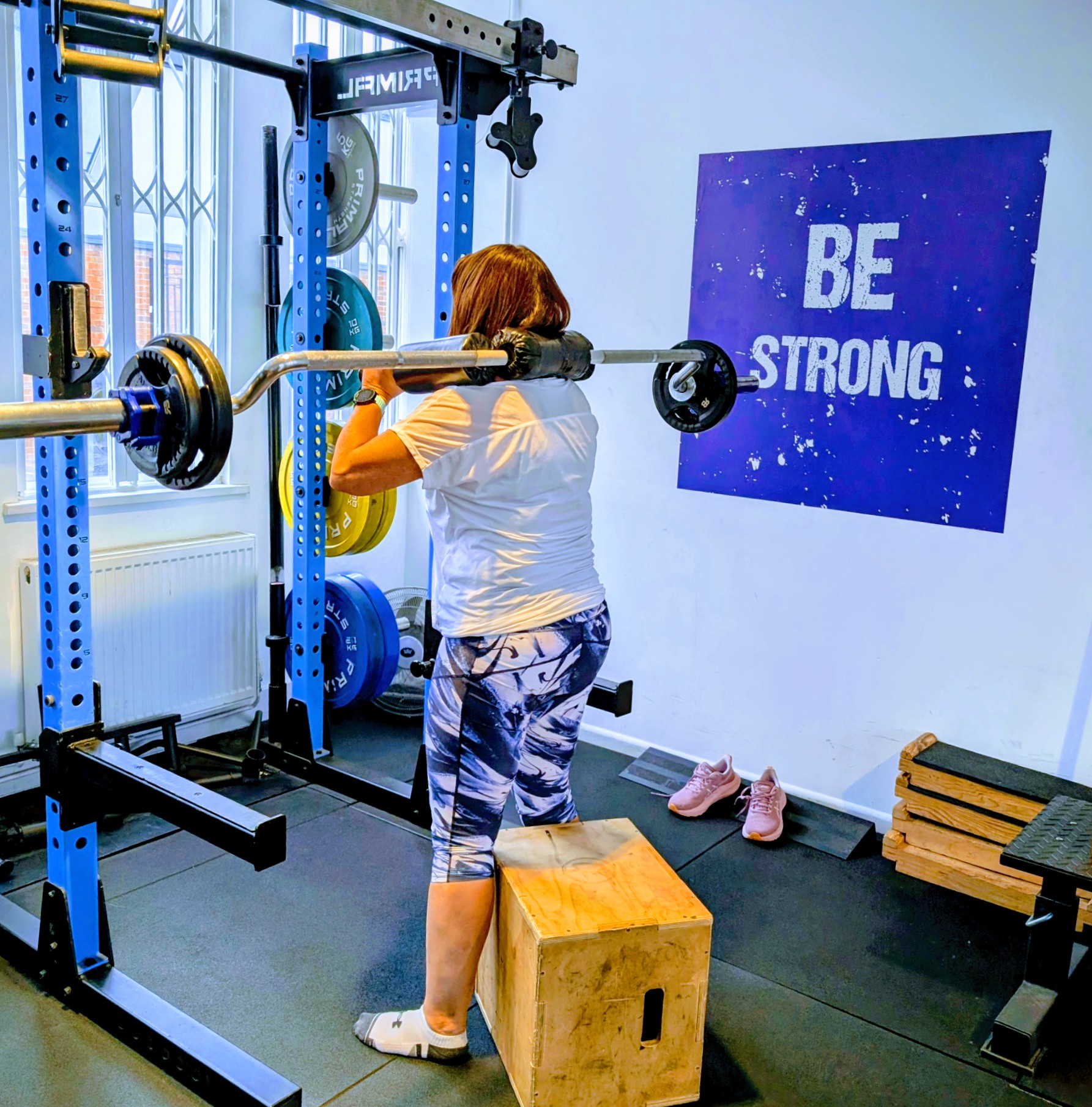Beginner Strength Training in Nottingham (2–4 Day Plans, Safe Form & Progression)
Who is this for?
This is perfect for absolute beginners, busy professionals, and anyone returning to lifting after a break.
At Real World Fitness in Colwick (near Netherfield, West Bridgford, Edwalton and Carlton), we specialise in getting normal people stronger—safely, simply, and without the ego. This page is your complete, no-nonsense guide to starting strength training and actually sticking with it.
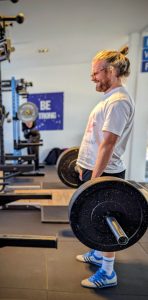
Deadlifts don’t have to be dangerous – Personal Training client Mike learning great form
What you’ll get on this page
* 2, 3 and 4-day beginner strength programmes (gym + minimal‑kit options)
* Exactly how heavy to start, when to progress, and when to stay put
* A simple warm‑up that protects joints without stealing energy from the main lifts
* Nutrition basics for strength (protein, creatine, timing) – no bro‑science
* FAQs, red‑flag guidance, and how we keep you safe at RWF
How often should beginners lift?
Aim for 2–3 days per week to start. Four days can work if you’re super eager, but only if life stress and sleep are decent. Your goal in month one is consistency and quality reps, not pushing a routine that even experienced lifters would struggle with.
As a guide, from our experience:
2 days/week = Great for busy schedules; full‑body each day.
3 days/week = Optimal for many; full‑body or A/B rotation.
4 days/week = Upper/Lower split, leads to shorter sessions, but only really works if your recovery is good.
Session length: 45–70 minutes including warm‑up.
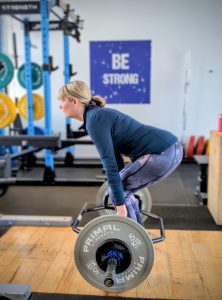
RWF Personal Training client Brom learning a deadlift
How heavy should you lift?
We use RPE 6–8 (Rate of Perceived Exertion). That means you finish a set feeling like you could have done 2–4 more reps with perfect form.
Starting loads:
Machines: Pick a weight you can do for the target reps with a couple left in the tank.
Free weights: Start lighter than you think. If in doubt, start with the empty bar for barbell lifts and build from there.
Progression rule (keeping it dead simple):
If you hit all your sets sets and reps, add 2.5–5 kg next time (or 1–2 kg on dumbbells if possible).
If you miss reps or creep to a 10/10 difficulty level, repeat the load next time – don’t add weight. Two repeats in a row? Reduce the weight by 5–10% and rebuild. Think about how a battering ram works – you don’t just lean it against the door, you have to go back and take a run up sometimes!
Warm‑up (you only need a few minutes)
1. General “wake up and get in the mindset to exercise” (2–3 min): brisk walk, bike, or row.
2. Ramp‑up sets: For your first two main lifts, do 2–3 lighter sets up to your working weight (for example, 10 reps with the empty bar, then 6 reps at around 50% of what your first working weight would be, then 3 reps at around 70%).
Technique first: the form cues we’ll coach in person
Brace: Breathe in, imagine you’re trying to inflate your stomach with the air to create a light belt of pressure. Exhale between reps, not during them
Range of movement: Deep enough to feel the target muscles work without pain or collapse of form. Range of movement (ROM) can vary between individuals based on injuries, flexibility and goals.
Tempo: On most exercises, a couple of seconds to go down, and a controlled “up” of 1-2 seconds. No bouncing or yanking – as a beginner, you’re after control, not the nonsense you’ll see most people doing in the gym!
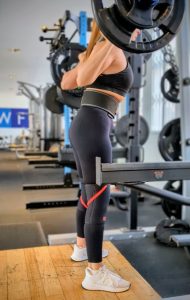
RWF Member Charlie having a squat form check session
Beginner Strength Training Free Programmes
Each plan is 8–12 weeks. Make sure you log your sessions (we prefer good old fashioned pen and paper, but I guess your phone will do!), aim for small weekly increases, and don’t chase failure. Rest 60–120 sec on accessories and 2–3 min on big lifts.
Option A — 2 Days/Week (Beginner Strength Training Machine Based Full‑Body)
Day 1
1. Leg Press 3×8–12
2. Seated Row 3×8–12
3. DB Bench Press 3×8–12
4. Hamstring Curl 2–3×10–15
5. DB Incline Press or Chest Press 2–3×8–12
6. Plank 2×30–45s
Day 2
1. Goblet Squat 3×8–12
2. Lat Pulldown 3×8–12
3. Machine Shoulder Press 3×8–12
4. Back Extension 2–3×10–15 (or glute bridge)
5. Cable Face Pull 2–3×12–15
6. Farmer’s Carry 2×20–30m
Progression: +1 rep per set until the top of range, then add +2.5–5 kg and repeat.
Option B — 3 Days/Week (Beginner Strength Training Barbell Based Full‑Body)
Day A
1. Back Squat 3×5
2. Bench Press 3×5
3. Seated Row or Chest‑Supported Row 3×8–12
4. DB Split Squat 2–3×8–10/leg
5. Face Pull 2–3×12–15
Day B
1. Deadlift 2×5 (stop well short of major difficulty)
2. Overhead Press 3×5
3. Lat Pulldown 3×8–12
4. Leg Press 2–3×10–12
5. DB Curl + Cable Pushdown (superset) 2–3×10–12
Day C
1. Front Squat or Goblet Squat 3×5–8
2. DB Bench Press 3×8–10
3. Hip Hinge (Dumbell Romanian Deadlift) 3×8–10
4. Single‑Arm Cable Row 2–3×10–12/side
5. Side Plank 2×20–40s/side
Progression: Add 2.5 kg to barbell lifts when all sets feel like an 8/10 difficulty. For machine/cable exercises, try the next pin or plate up!
Option C — 4 Days/Week (Beginner Strength Training Upper/Lower)
Day 1 – Lower
1. Back Squat 3×5
2. Romanian Deadlift 3×6–8
3. Leg Press 2–3×10–12
4. Calf Raise 2–3×12–15
5. Plank 2×40–60s
Day 2 – Upper
1. Bench Press 3×5
2. Lat Pulldown 3×8–12
3. Seated DB Shoulder Press 2–3×8–10
4. Chest‑Supported Row 2–3×8–12
5. Triceps Rope Pushdown 2–3×10–12
Day 3 – Lower
1. Squat 3×5–8
2. Hip Thrust 3×8–12
3. Hamstring Curl 2–3×10–15
4. Reverse Lunge 2–3×8–10/leg
5. Side Plank 2×20–40s/side
Day 4 – Upper
1. Overhead Press 3×5
2. One‑Arm Cable Row 3×8–12/side
3. Incline DB Press 2–3×8–10
4. Face Pull 2–3×12–15
5. DB Curl 2–3×10–12
Progression: Small weekly jumps on barbell lifts. On smaller lifts, machines/cables, just try the next pin or plate up!
Minimal‑Kit / Home Options
Two‑Dumbbell Circuit (20 minutes):
1. Goblet Squat 3×10
2. DB RDL 3×10
3. DB Floor Press 3×10
4. One‑Arm Row 3×10/side
Rest between 60–90s between moves; pick loads at RPE 7–8.
When to deload or hold
Two hard weeks in a row at 9/10 difficulty? Keep weights the same for 1 week and reduce total sets by 25–30%.
Stuck for 2–3 weeks on a lift? Drop 5–10% and build it back up from there
Life stress high and/or sleep poor? Choose the 2‑day plan or take away couple of accessory sets.
Nutrition basics for strength training beginners
Protein: Aim for 1.6–2.2 g per kg of bodyweight, per day. Spread across 3–4 meals. Simple rule: a palm‑size portion at each meal.
Carbs: Fuel training with a carb‑containing meal 1–3 hours pre‑session; small snack after if you won’t have a bigger meal straight away
Fats: Include them, but don’t let them take the place of protein and carbs around training.
Creatine (optional but useful): 3–5 grams per day, any time of day, with water. Read our article on creatine here.
Hydration: If your sessions are less than around 75 minutes, water is plenty. You really don’t need sugary sports drinks unless your nutrition hasn’t been that great that day!
How we keep beginners safe at RWF
Capped membership and a calmer gym floor—less waiting, better focus
Personal trainer‑led onboarding: we’ll check your squat/hinge/press set‑ups and pick sensible starting loads
Clear progression: no sudden weight or technique jumps; just steady, weekly gains
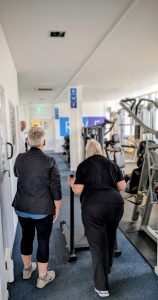
RWF PT Christine helping an older client learn to walk again
Beginner Strength Training FAQs
Do I need to be fit before I start?
No. These programmes *make* you fit and strong. We start at a level you can own and progress weekly.
Machines or free weights to begin?
Either works. Many start with machines to build confidence and then add barbells once movement patterns feel natural.
Will I get bulky?
Not by accident. Muscle gain is gradual. You’ll look and feel more athletic long before you look ‘bulky’.
I’m 50+ / post‑menopause—can I start?
Absolutely. Strength training supports bone density, balance and confidence. We’ll use joint‑friendly progressions and build up gradually.
How long until I notice progress?
Most beginners feel stronger in 2–4 weeks and see visible changes in 6–12 weeks, assuming consistency with training and protein.
What if something hurts?
Stop the painful movement, swap to a friendlier variation and talk to a personal trainer. Sharp pain is a red flag; normal muscle fatigue is fine.
Ready for a guided start?
If you’d like us to set your exact starting weights and watch your first few sessions, book a beginner consultation. Real World Fitness is in Colwick, with easy access from Netherfield, West Bridgford, Edwalton and Carlton, and free on‑site parking.
Book a free Personal Training session today
If you’re in Colwick, Netherfield, West Bridgford, or anywhere else in Nottingham and you’re considering personal training, now’s your chance!
Book your FREE personal training session today and turn your fitness dreams and transformation goals into an achievable reality.
Don’t just take our word for it; feel the difference in guidance, expertise, and motivation. Nottingham residents, your journey to the best version of yourself starts with just one session.

